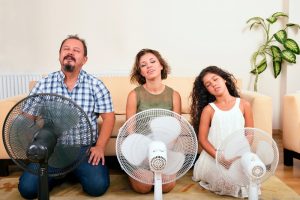Heat pumps are rising in popularity as people come to realize the extent of the benefits they provide. Their construction and method of operation allows them to provide a heat output equal to that of more traditional furnace and boiler systems, but with only a fraction of the cost. They’re both energy efficient and safe. How do heat pumps actually accomplish this feat? Read on to learn about the inner workings of heat pumps, and how they can provide such substantial advantages.
Heat Pump Anatomy
A heat pump is actually very similar to an air conditioner in terms of construction. There are two units, one installed inside the house and one outside. These units are connected by a conduit that allows them to share power, refrigerant, and any other resources necessary for operation. The most important part of this infrastructure is the refrigerant line, which is what makes it possible for the heat pump to actually move heat from one location to the other.
Heat Pump Operation
A heat pump is constructed similar to an air conditioner because it actually operates very much like an air conditioner. However, while an air conditioner will leech heat from the air inside the home and vent it outside, the heat pump does the opposite. When the thermostat calls for heat, the outside part of the heat pump begins to evaporate refrigerant using a coil inside the casing. This process makes the refrigerant gas into a heat sink, drawing the heat from the surrounding air and into the coil. The refrigerant gas, now holding the heat from outside, then travels down the refrigerant line and into the inside unit, where it is condensed back into liquid. This releases the heat to warm the air being circulated through the house.
Heat Pump Benefits
The way in which heat pumps heat makes them extremely energy efficient, because they don’t rely on any sort of fuel combustion to operate. All a heat pump needs to warm a home is thermal energy from the surrounding air and electricity to run on. Not only is this more efficient than heating systems like furnaces and boilers, but it is safer as well. Combustion systems produce a number of extremely toxic gases, which need to be vented outside of the home to prevent injury or death. Heat pumps don’t need these extra safety measures, because they don’t produce any toxic byproducts.
If you’d like to know more about heat pumps, call Roznovak. We provide heat pumps throughout Taylor, TX.
Continue Reading
Tags: Heat Pumps, Taylor
Posted in Heat Pumps | Comments Off on How Does a Heat Pump Heat?
 If you own a heat pump, you know how great they are–they’re super efficient, highly effective, and can provide comfort year-round with just the flip of a switch. But no matter how efficient or effective your heat pump is, it is going to require repairs from time to time, and when this happens, it is best to contact a professional for air conditioning repair in Georgetown, TX as soon as possible.
If you own a heat pump, you know how great they are–they’re super efficient, highly effective, and can provide comfort year-round with just the flip of a switch. But no matter how efficient or effective your heat pump is, it is going to require repairs from time to time, and when this happens, it is best to contact a professional for air conditioning repair in Georgetown, TX as soon as possible.





